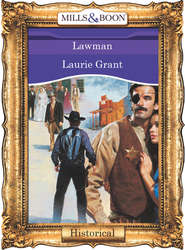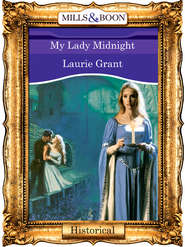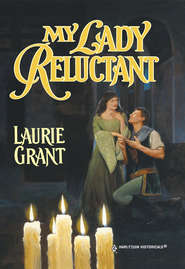По всем вопросам обращайтесь на: info@litportal.ru
(©) 2003-2024.
✖
The Ranger's Bride
Настройки чтения
Размер шрифта
Высота строк
Поля
Beatrice started to follow them, obviously eager to hear the horrid details, but Asa put out a hand. “I wouldn’t dream of detaining you, Miss Beatrice. Miss Addy and I will just sit out here on the front porch, so we won’t need a chaperon.”
“But—”
“I promise not to stay too long, Miss Beatrice,” Asa said, and this time Beatrice got the hint.
“I’d about given up on this,” Rede said, when Addy finally handed him the long-awaited coffee.
He was sitting in a chair next to the window, and the curtains were drawn. They had been open when she’d left the room.
“You shouldn’t be up. What if you had started your wounds bleeding again?” she scolded, figuring he’d arisen as soon as she’d left the room to shut the curtains.
He glanced at his shoulder and arm. “I didn’t.”
His matter-of-fact tone was a splash of cold water on her worrying. “I’m sorry you had to wait,” she said as she handed him the mug. “I got rid of them as soon as I could without acting suspicious, but I know it must’ve seemed like forever.”
He took a long sip, then closed his eyes for a moment. “This was worth the wait.” He took another sip, then barked out, “What’d the sheriff have to say?”
Addy shrugged. “The posse didn’t find them. When they got to the site, the outlaws’ trails led off in several different directions. They followed each, but eventually each trail petered out, either at the river or on stony ground.”
“Your sheriff surely didn’t expect them to be hanging around the bodies, counting their loot, did he?”
“He’s not—” she began hotly, then stopped herself from reacting to Rede’s needling. “No, of course not—Asa’s not an idiot, Rede. But I’m sure he was hoping to be able to trail them to their hideout.”
“He won’t find it,” he said, staring out the window rather than at her. “No one ever did before. The reports always indicated that they seemed to vanish into thin air.”
“And you think you can, if no one ever could before?” she challenged, still irritated at his scornful attitude.
He nodded. A half smile played about his lips.
Suddenly she was very conscious of still wearing a wrapper and her hair still lying on her shoulder in its night braid. “Well, if you’re sure you don’t want any breakfast and think you’ll be all right for a little while by yourself, I have chores to do.”
He nodded. “I reckon I’ll be right here,” he said with a wry twist to his lips.
An hour later, she had washed, dressed, and been out to the barn, where she scattered some feed for the chickens clucking in the yard. Next she poured out a measure of oats for Jessie and curried the horse while Jessie munched on them, then turned her out to pasture.
Stopping in the small vegetable garden just in back of the house, Addy picked some black-eyed peas and salad greens, holding them in her apron as she made her way back to the house. She cast an eye at the sun, which was almost directly overhead. Just about time for dinner. She decided she’d stop in the springhouse for a jar of cold water, then mix up some corn bread to serve with the peas and greens.
She’d checked on Rede, and found him dozing, and was just mixing up the corn bread dough when she heard the sound of a buggy halting out front.
Oh dear, another interruption, Addy thought as she hurried to the front of the house after pulling the door to her bedroom quietly shut. Who could that be?
An imperious rapping greeted her ears. “Mrs. Kelly!”
Addy recognized the booming nasal twang of Mrs. Horace Fickhiser, the wife of the mayor. Olympia Fickhiser was the self-appointed social arbiter of Connor’s Crossing and the mother of sixteen-year-old Lucille. The girl fancied herself a belle, but unfortunately she took after her short, thickset father and had too dumpy a build for true elegance.
Forcing a smile onto her face before opening her door, Addy said, “Good morning, Mrs. Fickhiser, Lucy. What can I do for you?”
“Lucille!” Olympia Fickhiser corrected Addy frostily in an overloud voice. “I did not name her Lucille to have it shortened into something so common, Mrs. Kelly.”
“Oh, Mama, she’s forgotten, I can just tell!” cried the girl, a pout forming on her Cupid’s-bow mouth.
“Have you forgotten we were to pick up Lucille’s gown for the cotillion today? I certainly hope it’s completed. It would be most inconvenient if you haven’t finished it.”
Fortunately Addy had completed the gown before her trip to Austin, but after what had happened yesterday, she had totally forgotten they were to pick it up today. But she was not about to admit that to Olympia Fickhiser.
“Naturally Lucille’s gown is ready, Mrs. Fickhiser,” Addy said smoothly. “All but the waist seam, which is only basted. I always leave that till the last minute, because that measurement has a way of changing, even for the best of us. Lucy will need to try it on, so come on in, ladies.”
Lucy must have been stuffing herself with sweets again, Addy thought, for she looked at least two inches bigger around the middle.
“Well, I suppose we should spare some time for this,” Mrs. Fickhiser allowed.
Addy led the way into her sewing room in the front of the house and took down the gown of lavender peau de soie with a white lace trim and a white bow over the bustle. Stepping behind the three-paneled screen to assist Lucy out of the dress she had been wearing and into the new one, she saw that her guess had been right. The bodice that had fit perfectly a week ago was now straining at the waist seam.
“I’m going to have to let out the waist just a little bit,” Addy called out to Olympia Fickhiser. “Don’t worry, it won’t take but a few minutes, so I can do that while you wait,” she added, sighing inwardly at the thought of delaying dinner even longer. Since the Ranger hadn’t wanted any breakfast, she hadn’t bothered to eat anything herself this morning, and now her stomach was growling.
“Nonsense. Just tighten her laces a bit more!” Olympia ordered in her wake-the-dead voice. “Lucille, I told you you shouldn’t have consumed that entire lemon pie!”
Lucy’s face went brick red with embarrassment, and Addy felt sorry for her.
“All right,” Addy called, but she had no intention of complying. The stocky girl was already so tightly laced she could hardly breathe.
Catching Lucy’s eye and putting a finger to her lips, Addy undid the back buttons, then moved to the laces at the back of the corset, but instead of tightening them, she loosened them just a bit.
Lucy gave her a grateful, conspiratorial smile.
After serving Mrs. Fickhiser the rest of the coffee and Lucy a glass of cold water from the springhouse, she set to work on the waist seam while the mayor’s wife chattered nonstop.
“You had quite an ordeal yesterday, didn’t you?” the woman asked, then, without waiting for an answer, droned on. “No wonder you look so fatigued. I’m certain you didn’t sleep a wink last night! Imagine, surviving because a dead man fell over on you! How ghastly! Why, if that had not happened—you could have met with a Fate Worse Than Death,” she intoned. “Didn’t I warn you it was dangerous to travel alone?”
“But Mama, what could be worse than dying?” Lucy asked, her round face all innocence, but there was mischief in her eyes.
“Never you mind!” Olympia snapped.
“Well, I wasn’t exactly alone,” Addy felt compelled to point out. “There were several other passengers…but perhaps we should speak of something else?” she said, darting a meaningful glance toward Lucy.
Olympia’s lips thinned, but she could hardly argue that the murderous assault on the stagecoach was a fit subject to discuss in front of her daughter.
“Of course,” she sniffed. “I merely meant to express sympathy. To change the subject, then, did you happen to hear of the couple that dared to try to buy the lot across from the mayor’s manse? No, of course you did not. This took place, I believe, while you were gone to Austin.”
Only Olympia, Addy thought wryly, would refer to her own house as a manse. “Were they not suitable in some way?” she inquired, keeping her eye on her needlework.
“Unsuitable?” the mayor’s wife crowed. “Why, that’s the understatement of the year, Mrs. Kelly! They had moved here hoping that no one would know what the woman—I shall not call her a lady—really was. But my sister in Houston—that’s where they came from, Houston—wrote and warned me.”
“Do you mean that the woman was a criminal?” Addy inquired, wondering if what Olympia Fickhiser was about to say was any more fitting a subject for an innocent young lady’s ears than murder had been.
“My dear Mrs. Kelly, perhaps not in the eyes of the law, but certainly in the eyes of decent folk. The woman had been divorced,” Olympia Fickhiser intoned in a stage whisper behind her hand.
Addy flinched at the distaste in the woman’s voice. If Olympia Fickhiser even suspected the truth about her, she would gather her skirts and sweep out of Addy’s house, telling everyone in Connor’s Crossing that the widow Kelly was actually a fallen woman whom no decent lady should patronize.











